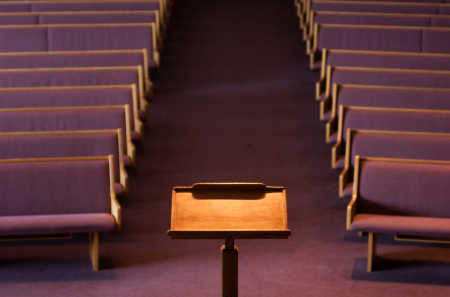As pastors age, majority struggle to find mature young Christian successors: study

As American pastors continue to skew older, with an average age of 52, a majority now say it is becoming increasingly difficult to find mature young Christians willing to do their jobs as they prepare to retire, data from a new Barna study shows.
Based on 585 online interviews with Protestant senior pastors nationwide, the study was conducted from September 6-16, 2022.
Researchers found that some 75% of the pastors in the study at least somewhat agree with the statement that "It is becoming harder to find mature young Christians who want to be pastors."
About a third of respondents "strongly agreed" that it's becoming harder to find young Christians to be pastors, up from 24% in 2015.
In the most recent survey, 71% at least somewhat agrees with the statement, "I am concerned about the quality of future Christian leaders."
With only 16% of pastors currently aged 40 or younger, Barna noted that American churches are likely to face a real succession crisis if the issue is not addressed.
The study comes as data from an October 2021 Barna survey suggested that nearly four out of 10 pastors (38%) said they are "seriously considering" leaving full-time ministry, which was a significant increase from the 29% of pastors who reported feeling this way several months earlier in January 2021.
As the world was still reeling from the pandemic in 2022, some Christian denominations, such as the Evangelical Lutheran Church in America, reported that they were already in the throes of a succession crisis with a national shortage of "at least 600" pastors.
Last May, when The Christian Post interviewed Nancy Rupe, an office administrator at Atonement Lutheran Church in Billing Heights, Montana, who is now retired, the church, which has more than 260 active members, had been waiting eight months to be assigned a new pastor.
"The shortage [is behind the wait], that's what they're telling us from the synod," Rupe told CP.
The church would go on to wait almost two years before Ryan Chaddick, 39, moved his family from Los Angeles to answer the call to become Atonement Lutheran Church's new pastor in July.
In an interview with CP Wednesday, Chaddick revealed that while both his grandfathers were Southern Baptist preachers and his father was also pastor of a nondenominational church, his entrance into ministry was not linear.
"There were social factors that sort of pushed me away from the Church for a while. I did the typical pastor's kid thing and had no interest in church. But then I discovered a denomination that is rooted and grounded in grace," Chaddick, who lives with his wife in Montana, told CP. "It's not about who we exclude. It's about welcoming and realizing that God's table, Christ's table, is big enough for all of us."
He said he eventually started attending an ECLA church in his 20s, and the senior pastor there convinced him that he was likely suited for ministry.
"It's something I thought about as a kid when I saw things that I didn't like. I remember thinking this church thing could be done differently, but I kind of just wanted to ignore those whispers, the stirrings of my bone," he said.
The new Atonement pastor said when he told his father he was thinking of becoming a pastor, his first question was, "Why would you want to do this?" pointing to how difficult ministry had become.
"My dad's actual, biggest concern was just, why would you want to do this? Again, you know, why would you want to do this?" Chaddick said. "[Pastoring has] only, it's become harder. And we've talked about that a lot."
Chaddick said one of the reasons he chose to move his family to Montana was because he was experiencing burnout during the pandemic.
"I got burnt out trying to, in Los Angeles, trying to keep the church going in the midst of the pandemic. It was … another reason we're here in Montana, just the need for bigger spaces, larger, more serene, space," he said.
Even though a majority of pastors are concerned about finding successors for their ministries, Barna noted that 79% of respondents also agree that "churches aren't rising to their responsibilities to train up the next generation of Christian leaders." It's not, however, out of a lack of desire to do so but competition from what they consider more pressing ministry priorities.
When asked if he was worried about Christianity in America, Chaddick said he believes the country is in a "post-Christian era" but doesn't necessarily see it as a bad thing.
"So many people think they are a problem to God. So many people see what they're not and see only where they think that they fall short. We live in cultures that thrive off of shame and blame. And I think it's behind addictions and behind trauma," he told CP. "In Christ, you're enough. That's already been decided. You carry the image of the divine within you. But we keep trying to earn it, and we keep trying to perfect our way into things."
Contact: leonardo.blair@christianpost.com Follow Leonardo Blair on Twitter: @leoblair Follow Leonardo Blair on Facebook: LeoBlairChristianPost





















